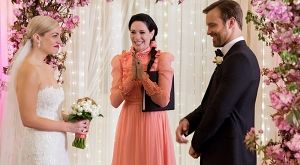
By now you’ve probably served as bridesmaid or groomsmen at a few weddings. If you’re lucky, you’ve even given a toast as maid of honor or best man during a dinner reception and nailed it. But there are those extra special people who actually get asked to officiate a couple’s wedding, which is perhaps the most special—and daunting—role of all.
If you’ve recently been tasked with this enormous honor, you were probably chosen because of your ease with words, or because you’re an expert public speaker, or maybe you know the couple better than anyone else. And yet it’s fine to feel a little intimidated with the task at hand—it’s a BFD. After all, this is one of the most important days of a couple’s life, you want to make sure you don’t mess it up and live on in wedding video infamy forever.
For some help on how to nail your role as officiant, we went to the experts at Speech Tank, a service that helps people write toasts and speeches for weddings, graduations, and all other sorts of important events. Below, Speech Tank’s Marisa Polansky and Kristine Keller share some of their tried and true advice for those who have been chosen to officiate a loved one’s wedding.
After being asked to officiate a wedding, how should one start preparing for that role?
“If you’re not already, you’ll need to get ordained. There are tons of painless ways to do this online, but be sure to check the state laws in where the couple is getting married as they vary state to state. Then, schedule a meeting with the couple to talk run of show. How long do they want the ceremony to run? Will there be readings? Will they be exchanging their vows? Any other customs they want to incorporate? Be sure you understand the expectations before you get drafting.
It’s also important to discuss tone. Does the couple want humor? Heart? Lightness? Sentimentality? It’s these questions that will help you structure your ceremony.”
What are some good ways to open a ceremony speech?
“First things first, you’ve got to follow the rules. It’s not the most fun answer, but there are some basic duties you’ve got to perform in your role–the first of which is ask everyone to be seated. People aren’t accustomed to being at a fancy event and they’re looking to you for some guidance for the run of show.
After you’ve secured the building blocks, the structure is all yours. We do encourage officiants to answer the question on everyone’s minds why you? How do you know the couple? Of course the ceremony should not be about you, but you’ve got to at least explain your relationship to the couple. This will likely come through in the stories you tell about the couple, but a one sentence intro could help.”
What if the couple has asked you to talk about them and their relationship during the ceremony? What are some good ways to go about doing this?
“Talk to the future spouses separately. Have them fill out a questionnaire about the other person if you’re more of a visual learner or record your conversation on the phone. They’ll likely share some gems that you hadn’t thought of. Ask them questions you don’t know the answers to. When did you know you loved your better half? What’s the last thing you say to each other before you go to bed at night? What is their life motto? What is your favorite thing about your betrothed? You can also survey their friends about what makes them such a strong couple.”
How much should one work on the ceremony speech with the couple?
“This will vary from couple to couple. Be sure they’re clear of your expectations. Often couples have chosen their officiants because they trust they can do a killer job and want to be surprised on the big day. Other couples want to see drafts and have complete sign-off approval. Remember, it’s all about them, so whatever they want, they get. (If only for just one day.)”
How long should a ceremony speech ideally last?
“This is another question for the couple but the sheer fact that they chose to have you officiate is a sign they aren’t the most traditional and will likely want it on the shorter side. No matter what, you’ll need to include the non negotiables–the intro, vows, statement of intent, exchange of rings, and proclamation. After that, it’s up to you and the couple. Keep context in mind, though. If it’s an outdoor ceremony in Texas in August, you might want to forgo the Shakespearean monologue. (Pro tip: always forgo the Shakespearean monologue and use your own words instead!)”
Is there anything else a person should know before agreeing to officiate someone’s wedding?
“Just know that it’s going to take work! But in the end this is a day that the couple—and you—will never forget.”












